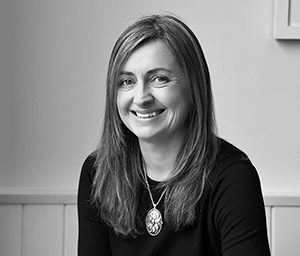Rosalie Craig is in the middle of learning lines for an upcoming theatre role. “We start rehearsing in two weeks,” she exclaims, “so I’ve been kind of desperately trying to learn every single line, which just won’t happen at this stage. I’m in the denial stage, basically!” She laughs. “Honestly, I think it gets worse the older you get. It’s all about repetition; it’s a sort of form of madness. Sometimes my daughter catches me around the house just reciting random lines, and she ignores me now; she realises that I’m not actually talking to myself.”
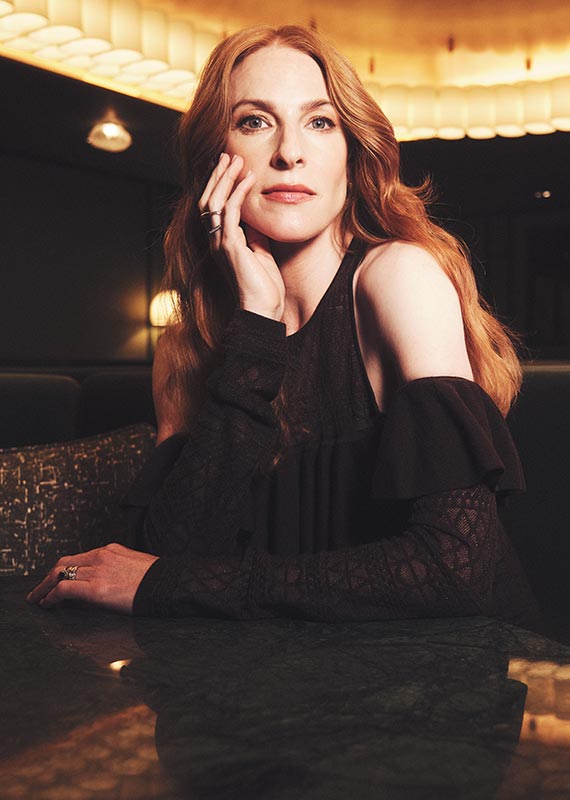 Rosalie wears: dress by Clea; and earrings by Giovanni Raspini
Rosalie wears: dress by Clea; and earrings by Giovanni Raspini
At the end of this month, she will be appearing in Good Night, Oscar at the Barbican. The play, written by Doug Wright, centres on the character of real-life pianist, composer, comedian and all-round entertainer Oscar Levant, played by Sean Hayes, who brings his acclaimed, Tony Award-winning performance to London, direct from a critically acclaimed Broadway season. The action centres around the filming of a fictionalised episode of The Tonight Show in 1958, and explores themes of celebrity, genius, the questionable role of the media, and Levant’s struggles with mental illness.
“I didn’t know how big a deal it was out on Broadway,” Rosalie admits, recalling when she first heard about the project. “Certainly, for Sean; apparently, he’s absolutely sensational in it, and I’m really excited about watching him do this. And I didn’t know anything about this character, Oscar Levant, and what a kind of traumatic life he had, and how complicit we all are in fame, and in other people’s downfalls, you know, and it’s kind of a nice lens on that. An interrogation of that really.”
Rosalie plays Oscar’s wife June, the only female in the cast. “They sent me the script to read, and I was really taken with it,” she tells me, when I ask about her character. “I just thought it was a really interesting project, and an interesting role for me. She’s a late-1950s American, quite a powerful wife character. I usually steer clear of playing wives, but this is kind of a different situation, because she commits him to a psychiatric ward because of his behaviour. But then she is the person who facilitates him going on television again; she gets him this pass for four hours, so he can go on this talk show. Essentially, she could be ending his career, so it’s quite a strange thing, that she feels that she has to get him on this TV show in order to end that chapter of himself. Maybe because she also needs to move on herself. There’s a lot of love there, you know, even if it’s a bit turbulent, and not a regular type of relationship.”
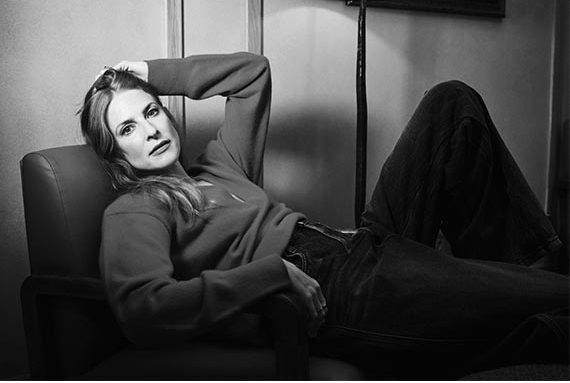 Rosalie wears: jumper and jeans by The Label Edition
Rosalie wears: jumper and jeans by The Label Edition
Having made her name professionally and spent much of her early career on the London stage, this will be Rosalie’s first theatre project for some time. “I was saying to some friends of mine recently, who are also in the business, that it’s a strange feeling, because I haven’t been on stage for maybe over four years now,” she reveals. “It had got to the point where, not that I was complacent about theatre projects, but I suppose that there would be less fear attached to them, because I would have maybe finished a big run in something, and then I’d be into rehearsals for something else. So, I was already on that treadmill. But because I’ve been filming for so many years now, I’m actually genuinely a little bit scared, which I never thought I would be. I think it’s kind of a good place for me to be though, that I am slightly fearful. Hopefully rehearsals will put those nerves in a slightly different place. But yeah, it’s a nice thing ahead…” And, at just seven weeks, it is the perfect length of run for her to dip her toes back into the world of theatre without committing to anything huge. “When you do a show in the West End, maybe not at the National or the Donmar, seven weeks is kind of the beginning of a run,” she laughs, “so you’re just sort of finding your stride. I’m hopeful that I’ll get to the end of the seven weeks and think, oh was that it? And want to do some more…”
“THIS INDUSTRY IS SO ADRENALINE CHARGED – YOU’RE ON THE HEAP AND THEN YOU’RE NOT – WE ARE KIND OF PROFESSIONAL GAMBLERS, I THINK, WITH OUR LIVES”
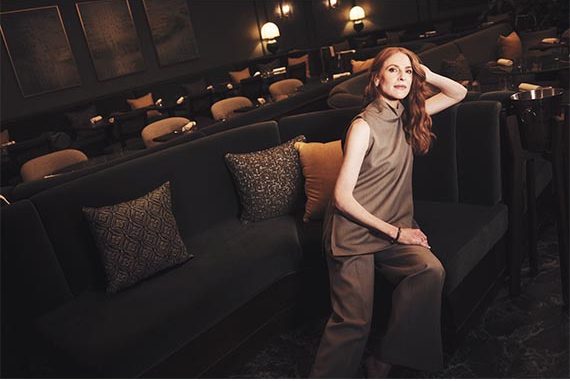 Rosalie wears trousers and top by The Frankie Shop; and jewellery by Lily Gabriella Fine Jewellery
Rosalie wears trousers and top by The Frankie Shop; and jewellery by Lily Gabriella Fine Jewellery
While it remains to be seen whether it is a theatre role or a screen role that comes next for Rosalie, we will be seeing her this autumn in a couple of TV projects that she filmed last year. First up, a part in The Hack, a seven-part ITV Studios series about the News of the World phone hacking scandal. Written by BAFTA, Tony and Olivier award winning screenwriter, Jack Thorne and starring David Tennant, Robert Carlyle and Toby Jones in leading roles it has been produced by the team behind Mr Bates vs The Post Office. Like that series, it promises to be both complex and thought-provoking. “The scripts are excellent, and Lewis Arnold is a phenomenal director,” Rosalie tells me. “And I think, from what I’ve seen, and what I was doing on set, they have handled it brilliantly. But it won’t come without a noise, you know, because this is something that always needs to be squashed down by the press, rather than elevated, I think.”
Her character has not currently been announced, making it tricky to discuss the role in any depth, but is obviously based on a true-life person. “It’s not the most enormous role I’ve ever played, but it was certainly an undertaking,” Rosalie explains. “I think that’s true of any sort of person who’s still living. There is a sort of different challenge, because people know her mannerisms potentially, or what she looks like, what she sounds like… I sort of did a deep dive into her – it’s probably over a year or so ago now, when I played her and when we were shooting – just researching and watching her. It is also funny playing a character who is not potentially liked by people. Sometimes I prefer playing real people, because you’ve got boundaries, or you’ve got a sort of blueprint of how to be that person, whereas with a fictional character, you’ve got to start from scratch, really – which is also thrilling, because you get to build them from the ground up. But I think this person is such a controversial figure for many people, so that was kind of slightly daunting, taking that on. But there’s lots of us who are playing those kinds of people in this series.”
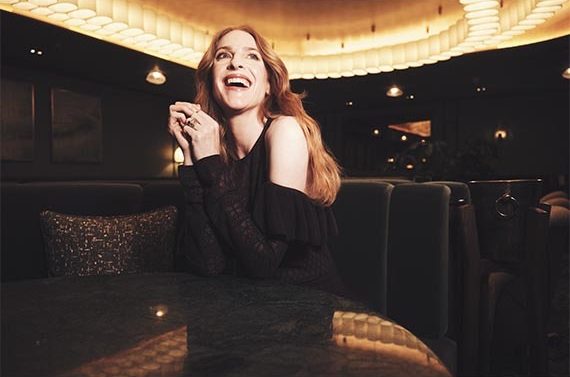 Rosalie wears: dress by Clea; and earrings by Giovanni Raspini
Rosalie wears: dress by Clea; and earrings by Giovanni Raspini
BBC drama Riot Women will come hot on the heels of The Hack. Written by award-winning writer Sally Wainwright (of Happy Valley and Last Tango in Halifax fame), and also starring Joanna Scanlan, Tamsin Greig, Lorraine Ashbourne, Amelia Bullmore and Taj Atwal, it tells the story of five women who put together a rock band in a bid to win a local talent contest. As they juggle demanding jobs, grown-up children, complicated parents, absent husbands and disastrous dates and relationships, the band becomes a catalyst for change in their lives, making them question everything they thought they knew.
Talking about the project, Sally has said that she is more excited about this than anything else she has ever written, and that she can’t wait to share it. And Rosalie is equally excited. “I’m sort of giddy excited about this one,” she admits. “It is the biggest TV role I have ever played; one of the greatest challenges of anything I’ve been asked to do, really. I mean, Sally’s an exceptional writer, but for her to say this is her favourite series she’s made so far… I mean, maybe she says that whenever she makes a series, but yeah, this one seems like a real labour of love for her. It’s a phenomenal story for women. I guess it’s a big story about friendship, and also new beginnings, and if it’s possible to start again post trauma, or post a part of your life where it’s been given solely to everybody else, and then they have moved out and moved on, and what are you left with? But equally, it’s Sally, so she likes the dark side of things, but also the humour and the joy and the love. It is incredible. So, so hilarious, but at the same time, you’ll have an amazingly hilarious, fantastic scene, then followed by something that is just gut punching.”
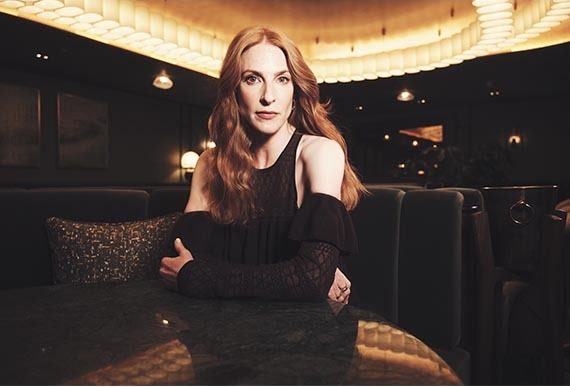 Rosalie wears: dress by Clea; and earrings by Giovanni Raspini
Rosalie wears: dress by Clea; and earrings by Giovanni Raspini
Rosalie plays the part of band member Kitty Eckersley. “She’s not like anything I’ve ever played before,” she tells me. “I think that was why it was so incredible, and so sort of mind-blowing, when Sally was like, ‘I want you to play the part’. Every day I was thinking somebody was going to tap me on my shoulder, and say, ‘This way please, you’re not supposed to be here!’,” she laughs. “If I’d been asked a year or so ago, would you love to work with Sally Wainwright, I’d have been like, are you kidding, yes, but how does anyone do something like that!” she tells me. “But if I had set my sights on her, I probably would have fallen apart in the meeting. And thought, oh my God, I can’t do this, because I want it so much that I’ll just scupper my chances.”
What can Rosalie tell us about Kitty? “She’s sort of from the wrong side of the tracks – very vulnerable,” she reveals. “I’m trying to think of stuff to tell you about her that won’t give away too much of the story… She hasn’t got a fixed address, and she’s this sort of person who has never really found their place in the world, and she just doesn’t belong anywhere. She’s very sharp, and hard, and vulnerable, and she’s quite violent at times… you know, just nothing that I’ve ever done before.”
Though she might not have played this sort of character before, with a background in musical theatre, the band scenes came more naturally to Rosalie than they did to others. “The other actresses had to learn to play instruments from scratch, and luckily, I didn’t,” she recalls. “But I think they loved the challenge of that. They were so amazing and just picked it up – learning the drums or bass guitar or the piano when you’re sort of mid 50s-early 60s was just a really beautiful, sort of all-embracing thing for them to do. It’s so uniting when you get to play music together as a band – I recommend it. You get to know people much quicker that way. When we first played a song together, we were like, oh my God, this is so cool! You know, where have we been? Because it’s a loud, angry noise. And I thought, yeah, I get what all those boys were doing at school now; I get it, they were getting all the angst out there.”
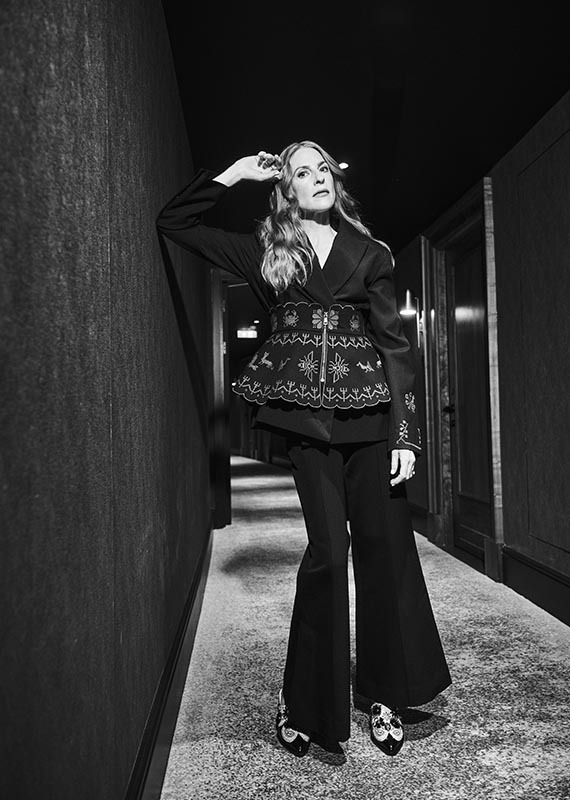 Rosalie wears: suit by Clea; and shoes by Kurt Geiger
Rosalie wears: suit by Clea; and shoes by Kurt Geiger
There were lessons to be learned for Rosalie, though. “I think having the gift of doing a part on screen, on film, for over six months, that was the biggest learning curve for me, and one that I don’t think I’ve been exposed to before,” she muses. “I’ve shot series before, but never played a character who was in every single scene. Theatre and film are different worlds, and they require different strengths, and different parts of you. I always feel like theatre is so instant – you create that scene there, and then it is gone. And I’ve always loved that about it. But I also really get why a lot of actors just love to be on camera. It is just a different feeling, and a different kind of adrenaline, I suppose. And essentially that’s what we are as beasts I think – we’re chasing the adrenaline. This industry is so adrenaline charged – you’re on the heap and then you’re not – we are kind of professional gamblers, I think, with our lives, and everything that we own.”
Acting certainly isn’t for the faint hearted, but Rosalie’s dedication seems to be paying off. “I grew up in Nottingham, in not a theatrical family, but my parents always took us to the theatre. I suppose I went to the theatre as a young girl, the Nottingham Playhouse, the regional theatre there, and just fell in love with it, and couldn’t shake it,” Rosalie recalls. “I ended up auditioning for a drama school called Rose Bruford College, because my parents said, ‘You can go somewhere where you can get a degree’. I mean I don’t know what a degree in performing arts would’ve got me in the real world, but I was like, ‘OK, if I’m allowed in, great!’ And I’m still amazed I got in there, because I was just so green. I think maybe my parents thought I might grow out of it at some stage, maybe they’re still hoping I will, but I haven’t grown out of it yet, so, yeah… I’m still going, still chipping away at the acting things. You know, when you go back home, and people go, oh, you’re still doing that are you? And I’m like, yep, all these years later, yes, I am…”
What is it that has kept her doing this, I ask. “I can’t deny that I love the feeling of performing or just becoming someone else,” she says. “I don’t know what that is – sometimes it’s a bit of an escape, really. Especially if you’re on stage, you sort of put your whole life on hold, and you just pretend to be someone else for a few hours, and then you can come back to you. I suppose it’s a form of escapism, but I don’t know quite what I’m escaping from. I haven’t quite worked that one out yet!” She shrugs. I can see where she is coming from – there’s undeniable appeal in the ability to shrug off everyday responsibilities for a few hours.
